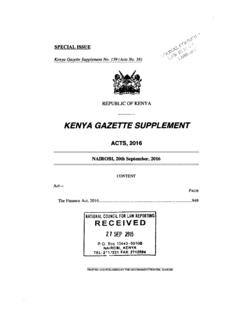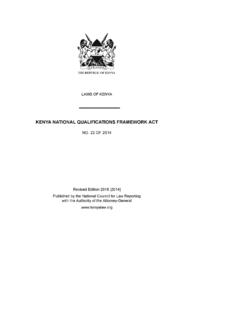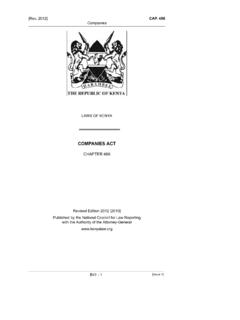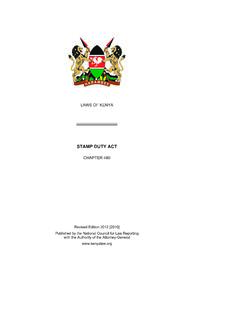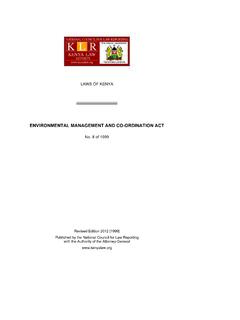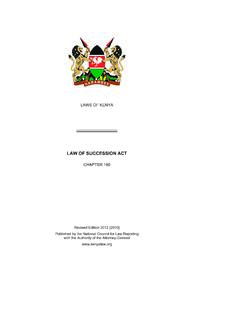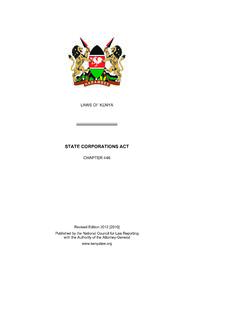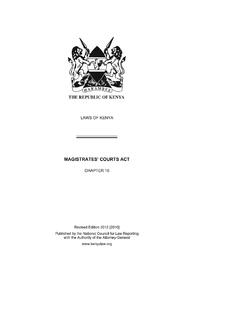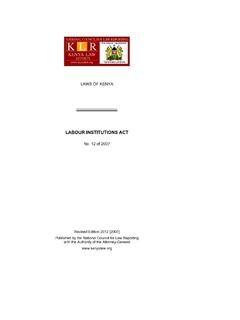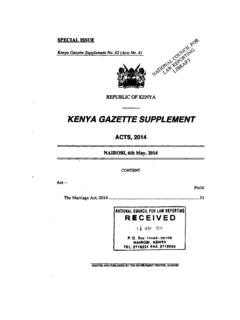Transcription of Paged Judicature Act Cap. 8 - No. 16 of 1967
1 LAWS OF KENYA Judicature ACT CHAPTER 8 Revised Edition 2012 [2010] Published by the National Council for Law Reporting with the Authority of the Attorney-General [Rev. 2012] CAP. 8 Judicature 3 [Issue 1] CHAPTER 8 Judicature ACT ARRANGEMENT OF SECTIONS Section 1. Short title. 2. Interpretation. 3. Mode of exercise of jurisdiction. 4. High Court is court of admiralty . 5. Contempt of court. 6. Protection of judges and officers. 7. Number of Judges of Appeal and the High Court. 8. Precedence of judges and of judges of appeal. 9. Retiring age. 10. Rules. 11. Spent. SCHEDULE [Rev. 2012] CAP. 8 Judicature 5 [Issue 1] CHAPTER 8 Judicature ACT [Date of assent: 4th July, 1967.] [Date of commencement: 1st August, 1967.] An Act of Parliament to make provision concerning the jurisdiction of the High Court, the Court of Appeal and subordinate courts, and to make additional provision concerning the High Court, the Court of Appeal and subordinate courts and the judges and officers of courts [Act No.]
2 16 of 1967, Act No. 8 of 1968, Act No. 4 of 1975, Act No. 6 of 1976, Act No. 14 of 1977, Act No. 6 of 1979, 162/1980, Act No. 12 of 1981, Act No. 19 of 1982, Act No. 10 of 1983, Act No. 19 of 1984, 65/1984, 275/1990, Act No. 10 of 1997, Act No. 7 of 2007, Act No. 10A of 2012.] 1. Short title This Act may be cited as the Judicature Act. 2. Interpretation In this Act, judge means the Chief Justice or a judge appointed under Article 166(5) of the Constitution or a judge of appeal appointed under Article 166(4) of the Constitution and includes acting appointments. [Act No. 14 of 1977, Sch., Act No. 10A of 2012, s. 2.] 3. Mode of exercise of jurisdiction (1) The jurisdiction of the High Court, the Court of Appeal and of all subordinate courts shall be exercised in conformity with (a) the Constitution; (b) subject thereto, all other written laws, including the Acts of Parliament of the United Kingdom cited in Part I of the Schedule to this Act, modified in accordance with Part II of that Schedule.
3 (c) subject thereto and so far as those written laws do not extend or apply, the substance of the common law, the doctrines of equity and the statutes of general application in force in England on the 12th August, 1897, and the procedure and practice observed in courts of justice in England at that date: Provided that the said common law, doctrines of equity and statutes of general application shall apply so far only as the circumstances of Kenya and its inhabitants permit and subject to such qualifications as those circumstances may render necessary. (2) The High Court, the Court of Appeal and all subordinate courts shall be guided by African customary law in civil cases in which one or more of the parties is subject to it or affected by it, so far as it is applicable and is not repugnant to justice and morality or inconsistent with any written law, and shall decide all such cases according to substantial justice without undue regard to technicalities of procedure and without undue delay.
4 [Act No. 14 of 1977, Sch.] CAP. 8 [Rev. 2012] Judicature [Issue 1] 6 4. High Court is court of admiralty (1) The High Court shall be a court of admiralty , and shall exercise admiralty jurisdiction in all matters arising on the high seas, or in territorial waters, or upon any lake or other navigable inland waters in Kenya. (2) The admiralty jurisdiction of the High Court shall be exercisable (a) over and in respect of the same persons, things and matters; and (b) in the same manner and to the same extent; and (c) in accordance with the same procedure, as in the High Court in England, and shall be exercised in conformity with international laws and the comity of nations. (3) In the exercise of its admiralty jurisdiction, the High Court may exercise all the powers which it possesses for the purpose of its other civil jurisdiction. (4) An appeal shall lie from any judgment, order or decision of the High Court in the exercise of its admiralty jurisdiction within the same time and in the same manner as an appeal from a decree of the High Court under Part VII of the Civil Procedure Act (Cap.)
5 21). 5. Contempt of court (1) The High Court and the Court of Appeal shall have the same power to punish for contempt of court as is for the time being possessed by the High Court of Justice in England, and such power shall extend to upholding the authority and dignity of subordinate courts. (2) An order of the High Court made by way of punishment for contempt of court shall be appealable as if it were a conviction and sentence made in the exercise of the ordinary original criminal jurisdiction of the High Court. [Act No. 14 of 1977, Sch.] 6. Protection of judges and officers No judge or magistrate, and no other person acting judicially, shall be liable to be sued in a civil court for an act done or ordered by him in the discharge of his judicial duty, whether or not within the limits of his jurisdiction, provided he, at the time, in good faith believed himself to have jurisdiction to do or order the act complained of; and no officer of a court or other person bound to execute the lawful warrants, orders or other process of a judge or such person shall be liable to be sued in any court for the execution of a warrant, order or process which he would have been bound to execute if within the jurisdiction of the person issuing it.
6 [Act No. 10 of 1983, Sch.] 7. Number of Judges of Appeal and the High Court (1) The Court of Appeal shall consist of not more than thirty judges. (2) The High Court shall consist of not more than one hundred and fifty judges [Act No. 6 of 1976, Sch., Act No. 14 of 1977, Sch., Act No. 6 of 1979, Sch., Act No. 12 of 1981, Sch., Act No. 19 of 1982, Sch., Act No. 19 of 1984, Sch., 65/1984, Act No. 10 of 1997, Sch., Act No. 7 of 2007, Sch., Act No. 10A of 2012, s. 3.] [Rev. 2012] CAP. 8 Judicature 7 [Issue 1] 8. Precedence of judges and of judges of appeal (1) The judges shall rank among themselves according to the priority of their respective appointments as judges: Provided that (i) persons appointed to act as judges who were previously judges shall rank according to the date of their original appointment as judges; (ii) the President, if he is of the opinion that there are sufficient reasons for so doing, may determine the precedence of judges irrespective of the priority of their respective appointments.
7 (2) The judges of appeal shall rank among themselves according to the priority of their respective appointments as judges of appeal: Provided that (i) persons appointed to act as judges of appeal who were previously judges of appeal shall rank according to the date of their original appointment as judges of appeal; (ii) the President, if he is of the opinion that there are sufficient reasons for so doing, may determine the precedence of judges of appeal irrespective of the priority of their respective appointments. [Act No. 14 of 1977, Sch., Act No. 10A of 2012, s. 4.] 9. Retiring age For the purposes of section 62(1) of the Constitution, the age at which a person holding the office of judge shall vacate his office shall be seventy-four years. [Act No. 6 of 1976, Sch., Act No. 14 of 1977, Sch., 162/1980.] 10. Rules The Chief Justice may make rules of court for regulating the practice and procedure of the High Court and, subject to any other written law, that of subordinate courts, and the power to make rules under this section shall include the power to prescribe fees and scales of remuneration.
8 [Act No. 4 of 1975, s. 2.] 11. (Spent) SCHEDULE [Section 3(1)(b), Act No. 8 of 1968, Sch.] PART I The admiralty Offences (Colonial) Act 1849. The Evidence Act 1851, sections 7 and 11. The Foreign Tribunals Evidence Act 1856. The Evidence by Commission Act 1859. The British Law Ascertainment Act 1859. CAP. 8 [Rev. 2012] Judicature [Issue 1] 8 The admiralty Offences (Colonial) Act 1860. The Foreign Law Ascertainment Act 1861. The Conveyancing (Scotland) Act 1874, section 51. The Evidence by Commission Act 1885. PART II 1. The President shall replace the Governor, and a magistrate holding a subordinate court of the first class shall replace a Magistrate or Justice of the Peace. 2. Where under the Merchant Shipping Act, 1894 anything is authorized to be done by, to or before a British Consular Officer, such thing may be done by, to or before a public officer appointed for the purpose by the Minister.
9 3. In section 51 of the Conveyancing (Scotland) Act, 1874, the High Court shall replace a Court of Probate. [Rev. 2012] CAP. 8 Judicature [Subsidiary] 9 [Issue 1] CHAPTER 8 Judicature ACT SUBSIDIARY LEGISLATION List of Subsidiary Legislation Page 1. High Court (Practice and Procedure) Rules .. 11 2. High Court ( admiralty ) Rules .. 33 [Rev. 2012] CAP. 8 Judicature [Subsidiary] 11 [Issue 1] HIGH COURT (PRACTICE AND PROCEDURE) RULES [ 1356/1952, 87/1964, Act No. 21 of 1966, Second Sch., 197/1969, 244/1969, 3/1970, 38/1974, 122/1975, 71/1976, 139/1980, 69/1981, 97/1981, 69/1982, 109/1982, 75/1985, 275/1990, 552/1991, 1/1992, 56/1992, 294/1995, Cap. 21, Sub. Leg., 116/1997, Act No. 10 of 1997.] RULES OF COURT UNDER SECTION 10 PART I VACATIONS 1. (1) The sittings of the High Court shall be three in every year. (2) Such sittings other than in the Coast Province shall be as follows (a) From 14th January to the second Wednesday before Good Friday; (b) from the Wednesday after Easter week to 31st July; and (c) from 16th September to 20th December.
10 (3) Sittings in the Coast Province shall be as follows (a) from 5th February to the Friday before Good Friday; (b) from the Wednesday after Easter week to 31st July; and (c) from 19th August to 20th December. [ 552/1991, s. 2, 1/1992, s. 2, 56/1992, .s. 2.] 2. (1) The vacations to be observed in the Courts and offices of the High Court shall be three in every year, viz., the Summer vacation, the Christmas vacation and the Easter vacation. (2) Such vacations other than in the Coast Province shall be as follows (a) The Summer vacation shall commence on the 1st August and shall terminate on the 15th September; (b) the Christmas vacation shall commence on 21st December and shall terminate on the 13th January; (c) the Easter vacation shall commence on the second Thursday before Good Friday and shall terminate on the Tuesday after Easter week. (3) In the Coast Province the vacation shall be as follows (a) The Summer vacation shall commence on the 1st August and shall terminate on the 18th August; (b) the Christmas vacation shall commence on the 21st December and shall terminate on the 4th February; and (c) the Easter vacation shall commence on the Saturday before Good Friday and shall terminate on the Tuesday after Easter week.
